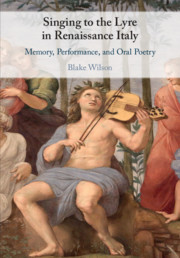Book contents
- Singing to the Lyre in Renaissance Italy
- Singing to the Lyre in Renaissance Italy
- Copyright page
- Contents
- Figures
- Tables
- Acknowledgments
- Abbreviations
- Introduction
- Part I The Canterino Tradition
- 1 Early History: Ioculatores and Giullari
- 2 The Trecento Canterino
- Excursus 1 Piazza San Martino: Performance, Place, and Audience in Florence
- 3 The Canterino in the Fifteenth Century
- Part II Cantare ad Lyram: The Humanist Tradition
- Bibliography
- Index
1 - Early History: Ioculatores and Giullari
from Part I - The Canterino Tradition
Published online by Cambridge University Press: 31 October 2019
- Singing to the Lyre in Renaissance Italy
- Singing to the Lyre in Renaissance Italy
- Copyright page
- Contents
- Figures
- Tables
- Acknowledgments
- Abbreviations
- Introduction
- Part I The Canterino Tradition
- 1 Early History: Ioculatores and Giullari
- 2 The Trecento Canterino
- Excursus 1 Piazza San Martino: Performance, Place, and Audience in Florence
- 3 The Canterino in the Fifteenth Century
- Part II Cantare ad Lyram: The Humanist Tradition
- Bibliography
- Index
Summary
This short chapter draws together the surviving evidence of the earliest practitioners of oral poetry in Italy, and lays the foundation for a number of themes that recur in later chapters: the rapidly shifting status of vernacular language, and the attendant shifts in the status and venues of those who, like these oral poets, made a living from it. Among the varied cast of characters that included poets of all ranks, were the prototypes of the professional canterini who mesmerized audiences in piazzas with dramatic renderings of narrative cantari, served the dynastic ambitions of the courts, and articulated the civic values of communal priors and captains. Depending on whether the historical witnesses were ecclesiastical (Salimbene de Adam, Thomas Aquinas) or secular (Giovanni da Viterbo, Lovato de’ Lovati), these early civic performers were regarded with varying degrees of suspicion, condescension, fascination, and admiration.
Keywords
- Type
- Chapter
- Information
- Singing to the Lyre in Renaissance ItalyMemory, Performance, and Oral Poetry, pp. 17 - 28Publisher: Cambridge University PressPrint publication year: 2019

